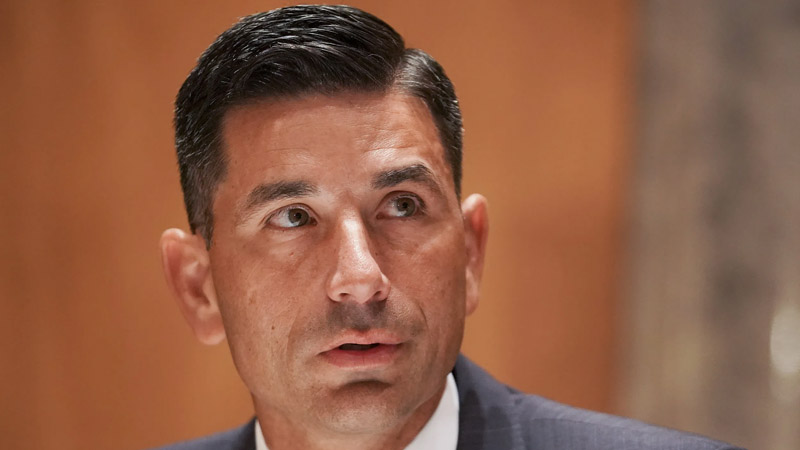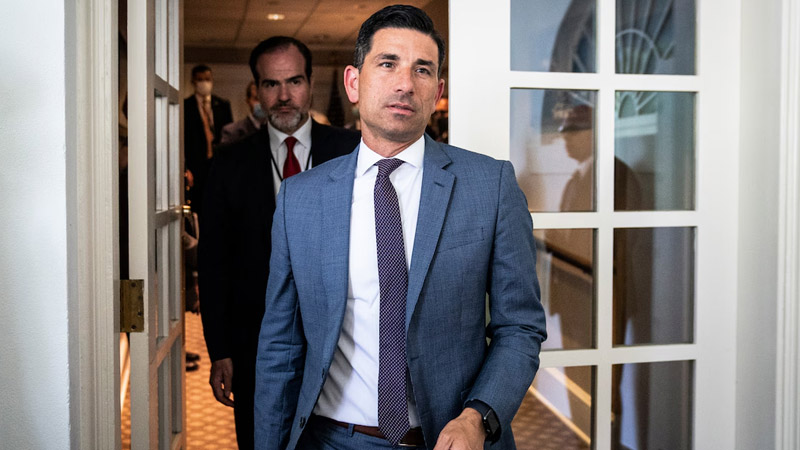Chad Wolf Pressed on Trump’s Mass Deportation Plan, Raises Concerns Over Economic Impact

Chad Wolf, acting secretary of the Department of Homeland Security, speaks during a Senate hearing in Washington, D.C., on Sept. 23. Photographer: Greg Nash/The Hill/Bloomberg
During an interview on CNN, Jake Tapper questioned former acting Secretary of Homeland Security Chad Wolf about the practicalities and potential consequences of President-elect Donald Trump’s proposed mass deportation plan. Tapper explored the economic and logistical hurdles of the ambitious proposal, including the potential cost and deployment of resources required to carry out such a large-scale policy.
Tapper began by noting that if Trump’s deportation standards were applied broadly, a significant portion of the U.S. workforce would be affected. “What happens to the economy if 5 percent of the workforce is deported?” Tapper asked. Wolf responded by emphasizing a need for prioritization within the deportation strategy. “Again, you’ve got to prioritize the removals…making sure you’re removing the worst of the worst,” said Wolf.
He argued that it would be misguided to ignore immigration law violations for economic reasons alone. “But this idea that you’ve got to turn your head and just exempt people from the law or from consequences of the law, deportation, and the like, because they have a job here in the United States — we certainly need to take a look at that, but there are other ways and other mechanisms, and certainly other visas that allow individuals to come in and to contribute to the U.S. economy. If Congress wants to do more, that’s a debate they should have.”
Tapper then pressed further, asking if the Trump transition team had been consulting with Republican lawmakers about how they would fund such an expansive deportation initiative. “Are Trump transition team members talking to Republican lawmakers to figure out how Trump will fund this plan?” he asked.

Wolf, careful not to speak directly for the transition team, responded that he “would suspect” such conversations were happening. “I think that’s really important because it’s not only just a change in policy, which obviously the president can do but obviously there’s going to be some resources required to make sure that those policies are implemented in a way that’s smart and consistent and that’s sustainable over the long term,” Wolf said, highlighting the complexities involved in enacting such a policy.
Tapper then raised the question of families with mixed immigration statuses, an issue likely to complicate mass deportation policies. “What about the impact — say there is an undocumented gentleman and he’s married to an American citizen and they have children. Does he get deported? What if both parents are undocumented, but the kid was born in this country? Do all three get deported? Is somebody gaming out all of these different permutations of the various statuses of these people?” Tapper asked.
Wolf avoided providing specific answers, stating, “Well, Jake, I’m not going to get into hypotheticals because the background of all these individuals really, really matters.” He reiterated the plan’s emphasis on prioritizing deportations for individuals with the most severe criminal backgrounds. “You go back to the prioritization of removing the worst of the worst first,” he concluded.
The interview highlighted the significant challenges and unanswered questions surrounding Trump’s proposed immigration policy, particularly regarding its funding, economic impact, and treatment of mixed-status families. While Wolf stressed the importance of enforcing immigration laws, Tapper’s questions pointed to the complex logistical and humanitarian implications of Trump’s plan. As Trump’s team prepares for the transition, it remains unclear how they will balance strict immigration enforcement with the potential fallout for American families and the economy.


